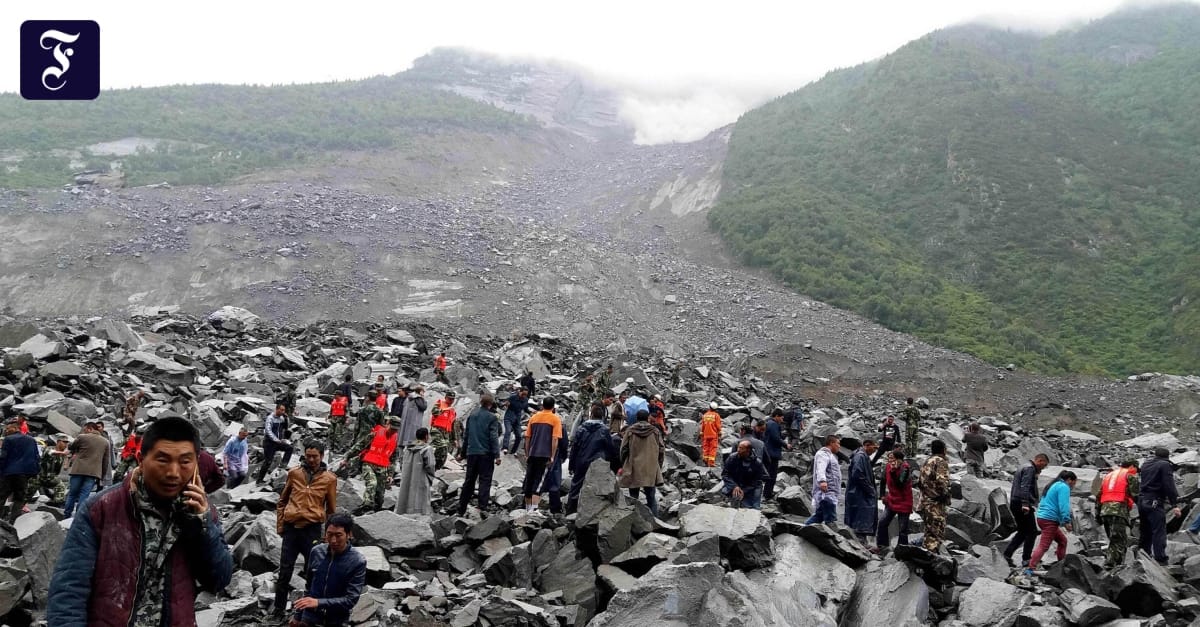A devastating landslide occurred in the Jinping village of Yibin City, Sichuan province, southwest China, in the late morning hours, leaving more than 30 people unaccounted for. The incident, which took place following prolonged and heavy rainfall, has underscored the region’s vulnerability to natural disasters exacerbated by extreme weather conditions.
The Scale of the Disaster
According to reports, the landslide struck at around 11:50 a.m. local time on Saturday, collapsing significant sections of the terrain and engulfing at least 10 homes in the process. Local residents were left scrambling for safety as debris cascaded down the slopes, trapping scores of people under the rubble. While one casualty has been confirmed so far, authorities fear the death toll may rise as rescue operations continue.
Preliminary analyses indicate that the landslide’s volume exceeded 100,000 cubic meters, stretching over a kilometer long. Such a calamity not only impacts the immediate lives of the villagers but also presents logistical challenges for rescue and relief teams on the ground.
An Intensive Rescue Operation Underway
Over 900 personnel, including armed police, firefighters, and emergency medical teams, have been mobilized as part of an expansive search and rescue mission. Equipped with helicopters, drones, and specialized machinery, their focus is set on locating the remaining missing individuals amidst precarious conditions. The Ministry of Emergency Management has declared the response as a Level I emergency—the highest classification for disaster responses in China.
One of their significant challenges lies in the unstable terrain, which could endanger rescuers navigating through debris and potentially cause secondary landslides. Authorities are monitoring the weather closely, as further rainfall poses a risk to rescue efforts and the safety of personnel.
A Presidential Call for Action
President Xi Jinping has urged all agencies to make an “all-out effort” to search for survivors and ensure the safety of both rescuers and locals. He stressed the importance of preventing similar disasters in the future by strengthening disaster preparedness and ensuring robust warning systems.
Residents of the affected areas have been evacuated to safer grounds, with temporary shelters and aid stations providing immediate necessities such as food, water, and medical care. Local authorities have also initiated an investigative committee to assess the causes behind the landslide and the circumstances leading to the loss of life and property.
Historical Context and Broader Implications
Sichuan province, renowned for its mountainous geography, has witnessed numerous landslides in the past. Frequent heavy rainfall, specific clay soil compositions, and human activities such as deforestation have long heightened the area’s susceptibility to such calamities. However, climate change and extreme weather patterns have intensified these risks, making occurrences like the Jinping landslide alarmingly common.
Looking forward, experts highlight the critical role of sustainable planning and environmental management in mitigating future risks. From reforesting vulnerable zones to constructing resilient infrastructure, a multi-faceted approach is essential for safeguarding both lives and ecosystems.
In addition, the Jinping landslide serves as a sobering reminder of the resilience required from disaster-stricken communities. While the immediate focus remains on rescuing survivors and supporting affected families, this tragic incident also calls for a national conversation about adapting to a changing climate and improving risk assessment frameworks.
An Unfolding Tragedy
As the rescue operation continues, family members of those missing await news with bated breath, holding onto hope amidst chaos. Across the nation, tributes pour in for the brave rescuers risking their lives to recover survivors and bring closure to anguished families.
The story of the Jinping tragedy is still unfolding, marking a grim chapter in China’s recent history of disasters. It is a stark reminder of humanity’s vulnerability to nature’s power and the urgent need for collective action to minimize future risks.



